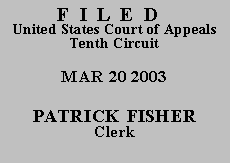

| MACHELL PHIBBS, on behalf of her minor daughter and as best friend of Nicolina Phibbs; NICOLINA PHIBBS, |
Nos. 02-4111 and 02-4212 (D.C. No. 2:02-CV-260-S) (D. Utah) |
ORDER AND JUDGMENT(*)
Before KELLY, McKAY, and MURPHY, Circuit Judges.
Proceeding pro se and in forma pauperis, Appellants Machell Phibbs and Nicolina Phibbs (collectively "Appellants") appeal the district court's dismissal of their complaint pursuant to 28 U.S.C. § 1915(e)(2)(B)(ii). Appellants also appeal the district court's denial of the motion they filed pursuant to Rule 60(b) of the Federal Rules of Civil Procedure. Appellants' motion to consolidate their two appeals is granted.
The claims raised in Appellants' complaint arise from a dispute over handicapped parking at Appellants' apartment complex. The defendants named in the complaint include the corporation which owns the apartment complex, the manager and assistant manager of the complex, several tenants, and a police officer who responded to a disturbance at the complex. The district court construed the complaint as alleging causes of action under 42 U.S.C. §§ 1983 and 1985(3). The court concluded that Appellants had failed to state claims upon which relief may be granted and dismissed the complaint pursuant to 28 U.S.C. § 1915(e)(2)(B). In reaching the determination that Appellants' complaint should be dismissed, the district court relied on Wilhelm v. Continental Title Co., a case in which this court concluded that disabled persons do not constitute a class of persons entitled to protection under 42 U.S.C. § 1985. See 720 F.2d 1173, 1175-77 (10th Cir. 1983). In addition, the district court concluded that the complaint did not allege any constitutional violation actionable under 42 U.S.C. § 1983.
On appeal, Appellants assert that the district court should have provided them with an opportunity to amend their complaint to correct any deficiencies. They also assert that their complaint contains additional claims under the Americans with Disabilities Act and the Fair Housing Act and that the district court erred when it dismissed the complaint without addressing those claims. This court reviews a dismissal pursuant to § 1915(e)(2)(B)(ii) de novo. See Perkins v. Kan. Dep't of Corr., 165 F.3d 803, 806 (10th Cir. 1999). The sua sponte dismissal of a pro se complaint for failure to state a claim "is appropriate only where it is patently obvious that the plaintiff could not prevail on the facts alleged, and allowing [her] an opportunity to amend [her] complaint would be futile." Whitney v. New Mexico, 113 F.3d 1170, 1173 (10th Cir. 1997) (quotation omitted). When reviewing the propriety of a dismissal for failure to state a claim, this court must construe a pro se litigant's complaint liberally, must accept the allegations in the complaint as true, and must construe the allegations and any reasonable inferences that might be drawn from them in the light most favorable to the plaintiff. See Gaines v. Stenseng, 292 F.3d 1222, 1224 (10th Cir. 2002).
We conclude that the district court properly dismissed Appellants' § 1983 and § 1985 claims. It is clear from our review of the record that Appellants cannot prevail on the facts alleged in their complaint and allowing them the opportunity to amend the compliant would be futile. Construing Appellants' complaint liberally, however, we also conclude they raised claims arising under both the Americans with Disabilities Act and the Fair Housing Act. The district court erred when it dismissed Appellants' complaint sua sponte without any discussion or analysis of those claims.
Accordingly, the district court's dismissal of Appellants' § 1983 and § 1985 claims with prejudice is affirmed. The court's dismissal of the remaining claims raised in Appellants' complaint is reversed and Appellants' appeal from the denial of their Rule 60(b) motion is dismissed as moot.(1) The matter is remanded for further proceedings not inconsistent with this opinion.
ENTERED FOR THE COURT
Michael R. Murphy
Circuit Judge
*. This order and judgment is not binding precedent, except under the doctrines of law of the case, res judicata and collateral estoppel. The court generally disfavors the citation of orders and judgments; nevertheless, an order and judgment may be cited under the terms and conditions of 10th Cir. R. 36.3.
1.Appellants did not challenge the dismissal of their § 1983 and § 1985 claims in their Rule 60(b) motion.